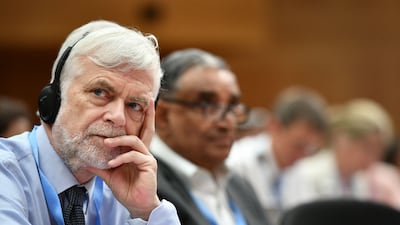Live updates: Follow the latest news on Cop28
Respected and precisely spoken, the UN’s top climate expert Jim Skea is the face of “the science” at Cop28.
His verdict on the summit’s first week? It’s “a Cop that’s making progress”.
It is also visibly an inclusive Cop, he says, speaking to The National in his temporary office at Dubai’s Expo City.
This is the first summit since Prof Skea, 70, was elected chair of the Intergovernmental Panel on Climate Change.
The IPCC’s job is to distil the world’s knowledge and give the authoritative facts on what the science is telling us.
Prof Skea has spent his time in Dubai meeting leaders, discussing the IPCC's next review cycle and reminding people what that science says.
For example, a scenario where global warming is limited to 1.5°C involves “a phase-out of unabated coal by 2050”, he says.
The Scotsman flanked Dr Sultan Al Jaber at a press conference where the Cop28 President said he “respects the science” after media reports about his views.
Prof Skea also stresses the IPCC’s independence and is not involved in the negotiations on how to slow global warming to 1.5°C, the goal of the Paris Agreement.
Those talks are now entering a tug-of-war over coal and fossil fuels after a draft text showed negotiators are considering everything from a full phase-out to agreeing nothing at all.
Some Cops like the Paris deal are headline-grabbing events while others are more a “hard grind of negotiating work”, Prof Skea said when he last spoke to The National in Germany in June.
Asked in Dubai how the talks are shaping up so far, he said: “It’s a Cop that’s making progress.
“It isn’t a landmark like Paris or Glasgow, but we’ve seen a lot of progress on the first day with the loss and damage fund being established. So we definitely have seen achievements.”
Scientists have presented findings at Cop28 that the chance of never passing 1.5°C is diminishing, leaving the world with a Plan B of overshooting and then trying to claw its way back.
These are not official IPCC findings but they mean the world may have to start preparing for the impact of an overshoot and potentially to go “net negative” to repair the damage.
“Net negative means taking carbon dioxide out of the atmosphere, because you have to compensate for harder-to-abate sectors, emissions you can’t avoid,” said Prof Skea.
“That covers a wide range of different possible techniques. Most of the carbon dioxide removal taking place at the moment is with avoided deforestation, reforestation, afforestation. It’s mainly in that area. This is not rocket science – it’s doing things that we know about quite well.
“In the longer term, we might move to more engineered approaches, like bioenergy with carbon capture and storage or direct air capture, the more technological means.”

In his campaign to lead the IPCC, Prof Skea ran on a platform of inclusion, promising to make sure that people “from all kinds of backgrounds” contribute to its scientific work. He had been at talks, he said, where delegates from developing countries had to leave early to use fixed-price plane tickets.
He won a run-off vote to lead the IPCC by 90 votes to 69 against Brazilian scientist Thelma Krug, while Debra Roberts of South Africa and Jean-Pascal van Ypersele of Belgium were the other candidates.
Dr Al Jaber has similarly made inclusivity one of four pillars of the UAE’s presidency, along with the energy transition, finance and a focus on people and livelihoods.
“You just need to walk around Cop – this is quite an inclusive Cop in terms of the range of people who are there,” Prof Skea said in Dubai.


